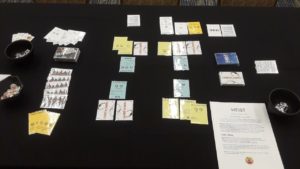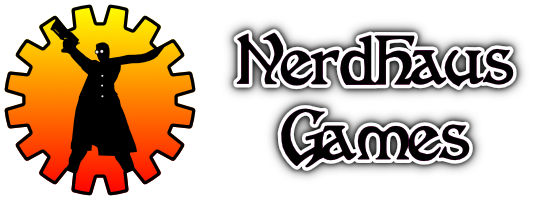I’ve had the highest number of games in the shortest amount of time recently, averaging a game of Heist every two days for a couple weeks. I’m about due for a new printing of this one, so I imagine it’s time to discuss what I’ve learned. I’ll start with a heartfelt thanks to my playtesters at KantCon, my household game nights, and visitors staying with us. I promise there’s a plan in development to make it easier to play a game if you are further than a short drive away from Kansas City.
The game itself is a card game about team and resource management where you take on the role of an international criminal competing with rivals to steal the most interesting things in the shortest amount of time. You hire a crew, buy gear, and play event cards from your hand (all of which are resource cards and can be spent as money) to make it easier to attempt one of the jobs face-up in the middle of the table. Each job has a number of complications which add to the difficulty, but can also add to the reward if completed successfully. The items themselves are a collection of (mostly real) objects stolen throughout the modern age, including famous works of art, classic cars, national icons, rare collectibles, and some local jobs like corner stores and small banks. By matching your crew’s skills to the jobs, you can avoid taking heat, which is the attention of the authorities. Gain too much heat on your crew and someone is going to jail. The player with the most prestige at the end of the game wins, but rivals don’t know if you are hiding extra prestige cards in with your resource cards. Victory is not a foregone conclusion just by having a lot of points showing.

I’ve had the chance to run it with two players all the way up to six, including a couple of times watching it played with six and not having to play myself. I highly recommend doing this, since it frees you up to clarify when needed, take notes, and just take in the game. It’s a great moment when you hear the terms you created coming out of other people’s mouths. It starts to sound like just another card game, which is good! Hearing people deal the cards and add the tokens and handle everything without my help let me know it all works without my being there to play it for them. I haven’t had any blind testing experience yet, but that’s the next step.
What works is the flow of the game, the text on the cards, and the clarity of what you are supposed to do when in order to win. It’s a playable game. Some tweaks will need to be introduced to help rubber-band the game (help keep the gap between first and last place a little tighter), round out the player interaction, and a couple dozen wording tweaks to prevent confusion. Most of the time even the poorly worded cards get played correctly, but most of the time isn’t often enough. I’m careful to take notes across multiple plays of the game, because tweaking the victory points or character abilities after one blowout does nothing but keep you in development forever. Even knowing the fix I want, I will often wait a few weeks and a dozen plays before I edit to determine which thinks are flukes and which are in fact problems. A broad range of data is critical to determining precisely which pressure points are the issue and which are just game experiences. For example, I had a theory that the starting hand size was too small, leading to a sluggish beginning of the game. Raising it from three cards to five improved the flow of the first turns dramatically and it’s a fix I will be keeping.
I’ve developed some key questions I ask during the feedback portion, write down everything someone asks me, and only speak to clarify the question someone had. If I was going to say something, it should have been in the game. Feedback is the time for a player to share their experience, not be told about fixes and flaws and justifications.
Some of what has been discussed has included ideas for expansions, some of which are enough fun that they might just make it. A superheroes expansion is almost certain, and a time travel expansion to let you steal items throughout antiquity might be fun, too. A two-player variant that is just security forces vs. a single criminal organization also came up, expanding on the job and complication system to make it the entire game. A lot of good ideas, a lot of energy, and folks were generally pleased to be playing. I always take it as a good sign when people ask when they can buy the game.
Anyhow, development continues. Let me know if you’re interested in sitting down and playing it in person, in signing up over at the Patreon to be a part of the playtest Inner Circle where I will post print-at-home copies and start compiling a list of playtesters to mail copies to, or in discussing the game further. Which expansions sound like a good idea? What would you steal given the opportunity? Let me know in the comments below.
